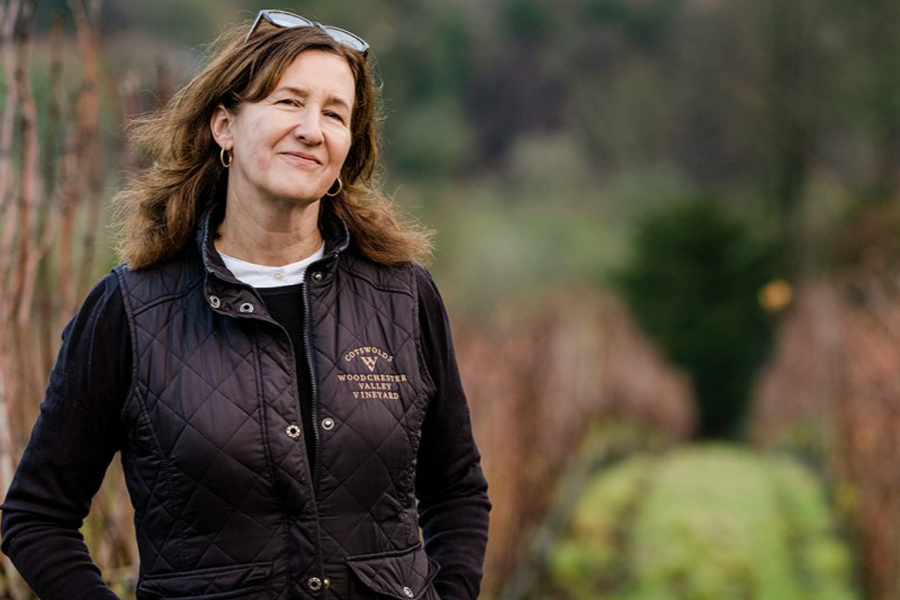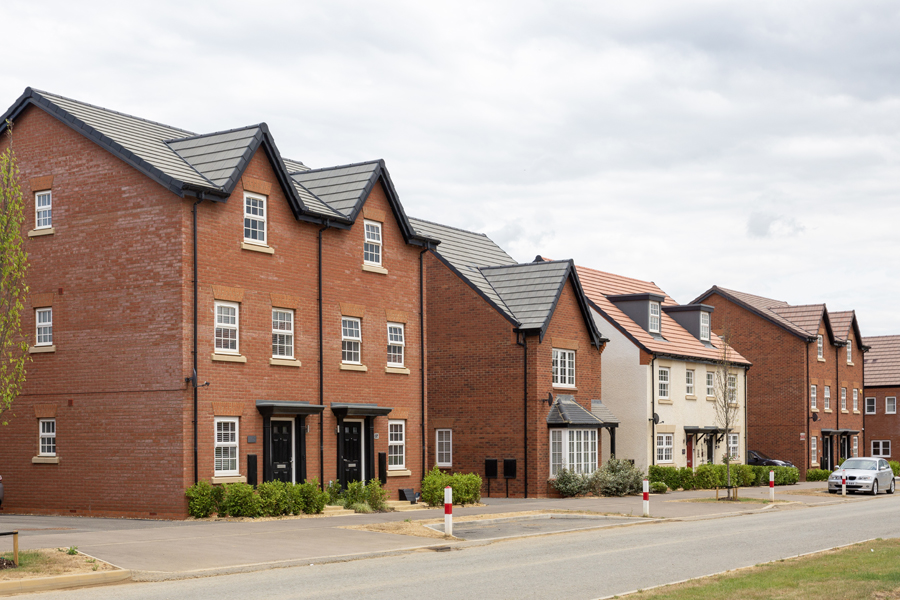Fiona Shiner of Gloucester's Woodchester Vineyard on being at the vanguard of Cotswold wine

A Gloucestershire vineyard established less than 20 years ago is exciting global wine connoisseurs
There are more than 700 vineyards in the British Isles. That sounds a lot, but Italy has more than 45,000 and France 27,000 (the European Union has around 45 per cent of the world’s wine-growing areas).
So it is even more impressive that a UK vineyard established in just 2007, which only bottled its first wine 13 years ago, produced a Sauvignon Blanc in 2021 judged one of the best in the world by some of the globe’s most experienced wine connoisseurs.
Earlier this year the Global Sauvignon Blanc Masters awarded Woodchester Vineyard’s Sauvignon Blanc a Master medal. It is the first English still wine ever to have won the prestigious award.
The woman behind the success of the Gloucestershire vineyard is Fiona Shiner, a qualified lawyer who only took up viticulture when she returned from Hong Kong in 2002 with her accountant husband, Niall and their three children.
“We went to Hong Kong in 1985 for three years and stayed for 17. We had an amazing time but came home because Niall’s job brought us back to the UK and we wanted our children to experience life in England.”
On their return, Fiona and Niall bought his parents’ Cotswold stone house which sits deep in a valley near Stroud. It had some land given over to a few rare breed sheep.
It took time to settle back in. “I was looking to go back to work and the obvious choice was the law, but I was keen to explore a non-office-based role, so I looked for an alternative.
“It was a tense, nervous moment when we tried our first wine. While we had done our research, you can never be sure. It was a huge relief that not only did we like it."
"We had a few acres around the house, and I thought that perhaps I could make them work for us.”
She began wondering about planting vines after her mother-in-law mentioned that its south-west-facing slopes could be perfect for grape growing, and the Romans may have planted vines there.
Inspiration came after a visit to several English vineyards, including Camel Valley. The rare breed sheep departed and Fiona planted just one acre with Bacchus, Pinot Noir and Seyval Blanc vines.
“That was our trial area. There was no reference point for us and no recent history of viticulture in the area. While Three Choirs in north Gloucestershire has been established since 1984, they are on red sand and we are on steep limestone brashy soil.”
Mothers-in-law are often right and four summers later, with advice and bottling help from Three Choirs, Fiona and Niall celebrated their first harvest.
Early success breeds ambition
“It was a tense, nervous moment when we tried our first wine. While we had done our research, you can never be sure. It was a huge relief that not only did we like it, but so did William’s Kitchen restaurant and delicatessen in Nailsworth which bought the majority of the 700 bottles from our first small harvest.
Vines take around seven to eight years to mature and start producing decent crops, so buoyed by her early success, Fiona enrolled on viticulture and winery workshops at Plumpton College near Brighton, the centre of excellence for wine making in the UK and where a lot of English winemakers go. “Our winemaker, Jeremy Mount trained there.”
More land was planted to vines and Fiona began to seriously consider establishing
a winery. “Our first crop in 2010 was quite good, but 2011 brought a three-month drought at the beginning of the year. We watered by hand. The yield was tiny, and we realised what a roller coaster the whole winemaking business was. For example, the year 2018 was amazing. We picked 180 tonnes – we’ve never picked that much since. In 2020 our yield was 59 tonnes.
Woodchester now produces on average around 85-90,000 bottles a year. “This will increase when our additional acreage comes online.”
The science of grape-growing
England is a cool climate for viticulture and our humid and damp conditions can make it challenging to grow vines. It rains a lot.
But vines do need water, particularly at the beginning of the year when the vines are getting going. “A bit of rain during the summer helps too. In England we usually get more rain than we want but in 2022 the summer was almost too dry.
“A cold winter is good news though, as it kills off diseases from the previous season and gives a fresh start. It also holds back- bud burst, because early buds are more vulnerable to spring frosts.”
Like most vineyards, Woodchester has some frost pockets and uses bougies (anti- front candles) to protect the young buds. These look like paint pots full of wax and are dotted around the vineyard.
“We have temperature monitors in the vineyard connected to my phone. If the temperature drops below a certain level, usually at unsociable hours such as 3am, I get a call and we mobilise a few people.
“We have more than 100 bougies to light which takes around half an hour. The bougies can lift the temperature by one to two degrees and make all the difference to the survival chances of the young buds.”
Europe suffers similar weather events, says Fiona. “Burgundy for example, can get hit by frosts much worse than ours.
“The weather is one major factor that we can’t control and this dictates the vine varieties we plant and the styles of wines we make,” she continued. “With our Bacchus variety, for example, we can make a good quality still wine every year whatever the English weather.
"We have other still wine varieties, such as Ortega which ripens well in an average English summer. A lot of them are not familiar names, but we also have Chardonnay, Pinot Noir, Pinot Meunier and, of course, Sauvignon Blanc – the more classic varieties for still and sparkling wine and some newer varieties such as Regent, created in the 20th century with disease resistance in mind – so there is less input into the vineyard, as well as quality.
“We look at what will grow in our cooler climate to ensure quality wine whatever the season. Our plantings allow for a degree of flexibility in the wines we produce each year depending on the harvest. Our red wine clones can go into our sparkling rosé, to give lots of character. But in a really hot summer we will pick what is suitable to make a good red wine. Pinot Noir in England is getting a nice reputation. 2022 will be a good year for English red I think.”
In viticulture, the term “clone” refers to a vine of a particular variety selected
and propagated for specific qualities. Pinot Noir has more than 100 different clones.
A sparkling wine clone tends to be higher producing, maintaining acidity for longer- lasting sparkling wines. Dijon clones, for example, are suitable for still Pinot Noirs. They are slightly lower yielding and more focused on wine flavours and aromas.
“In cooler years we will use our Pinot Noir in sparkling wine but in a really good summer we can also make a still Pinot Noir from suitable clones.
Fiona has planted around 10 different Pinot Noir clones and while still wines are a particular interest of hers, Woodchester Valley now also produces white, rosé, red and sparkling wines from 58 acres.
It is single estate, unusual in the UK, only making wine from the grapes it grows.
“We are truly a Cotswold wine, but that does mean if you get a low yield you have to wear it as we don’t buy in any grapes,” she says.
While Fiona has never discovered any clear evidence of Roman vineyards, there are fields around the area with historic names such as Vinefield. “We also know the Domesday Book of 1086 records vineyards at nearby Stonehouse.”
French open-minded about English wine
For many years English wine has been the butt of some unfair criticism. Surprisingly
a lot of this comes from home, says Fiona. “The French visitors who come to the vineyard, tend to be more open-minded and curious.” But while the pandemic was a challenge, it was also an opportunity to change minds.
“During Covid, we shut our shop and invested in a delivery van, which enabled us to build closer relationships with our customers, and when one person ordered, their neighbour often ordered too. Online orders from across the country went up around 700 per cent. It’s dropped back now obviously but is still an important part of our business.”
“Wine-making is completely absorbing. You love what you are doing and there’s always something happening.”
In 2016, experienced winemaker Jeremy Mount joined the team, moving from the Matua Winery in New Zealand to help set up the winery on site rather than having to contract out the production.
“Jeremy is from Kent. His family are top fruit farmers and he did a degree in viticulture and oenology at Plumpton,” said Fiona. “He has worked in the United States, France, Germany and Malta as well as New Zealand. When we interviewed him via Skype, the one thing on our absolute must list was that he needed to have made wine in England, which he had.”
The dream team makes wine with character
Fiona and Jeremy make a great team. “He is the winemaker; I look after the vineyard. We work closely together. He has a great approach to winemaking – not too much intervention in the winery to let the grape and the site speak for themselves. We want our wines to express a sense of time and place. And Jeremy is really good at bringing that out.”
In a short space of time, Woodchester Vineyard has become a sustainable business, certified under the WineGB Sustainable Wines Scheme. Fiona’s daughter, Chloe, has also moved from London to work in the business. As a trained accountant she’s involved in the finance, strategy and oversees the sales team.
From just four people a few years ago, Woodchester now employs around 25 full and part-time, with more joining inmthe summer. Woodchester Wine is sold online and locally – in Bristol, Bath, Oxfordshire and the Cotswolds. It has a London distributor which sells around the country and has a beautiful tasting room overlooking the Woodchester Valley.
“Wine-making is completely absorbing. You love what you are doing and there’s always something happening,” said Fiona.
“There’s the growing, production, sales and we also offer overnight accommodation, as well as hosting tasting tours throughout the year.
“This is a hands-on family business. We don’t want to be the biggest, but we do want to be one of the best.”
UK wine facts
• In 2021, the UK wine market size was $22.5 billion and is projected to grow at a compound annual growth rate of four per cent over the next few years.
• In 2021, approximately 67,097 hectolitres of wine were produced in the UK.
(source Statistica)
• There are more than 700 vineyards in the British Isles.
• Established in 1952 by Major-General Sir Guy Salisbury-Jones, Hambledon Vineyard near Portsmouth is England’s oldest commercial vineyard.
This feature appears in the May 2023 edition of The Business Magazine South West & Midlands. Read the magazine online at https://thebusinessmagazine.co.uk/archive/













